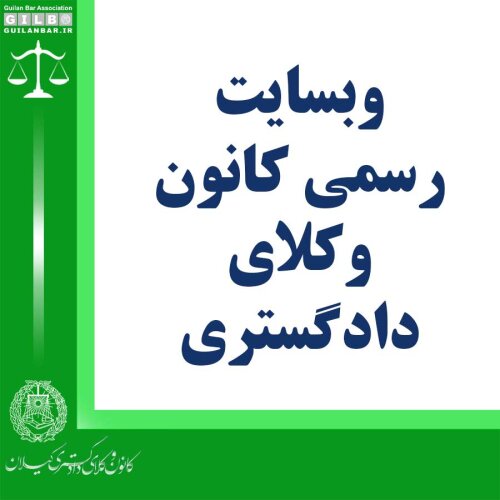Best Restructuring & Insolvency Lawyers in Rasht
Share your needs with us, get contacted by law firms.
Free. Takes 2 min.
List of the best lawyers in Rasht, Iran
About Restructuring & Insolvency Law in Rasht, Iran
Restructuring and insolvency law in Rasht, Iran deals with legal mechanisms designed to support individuals and businesses in financial distress. Located in Gilan Province, Rasht follows the Iranian legal code which sets out procedures for handling insolvency, bankruptcy, and debt restructuring. The goal of these laws is to balance the interests of creditors and debtors, maintain commercial stability, and, where possible, aid in the recovery or orderly winding down of failing businesses. In practice, the process may involve reorganizing assets, negotiating terms with creditors, or, when necessary, liquidating assets to settle outstanding debts.
Why You May Need a Lawyer
Restructuring and insolvency cases can involve complex legal processes and significant financial consequences. You might require the assistance of a lawyer in Rasht for several reasons, including:
- Your business is struggling to meet financial obligations and needs to negotiate with creditors.
- You are facing lawsuits or enforcement actions from creditors due to unpaid debts.
- You wish to file for bankruptcy or understand the available legal protections.
- You are a creditor seeking to recover outstanding debts from an insolvent business or individual.
- You need guidance on restructuring your business to avoid insolvency.
- You seek to understand your legal rights and liabilities throughout the insolvency process.
- You need representation during court proceedings or negotiations involving debt settlement or asset distribution.
Local Laws Overview
In Rasht, restructuring and insolvency matters are governed primarily by the Iranian Commercial Code, the Bankruptcy Code, and certain articles within the Civil Code. Some key factors to keep in mind include:
- Insolvency can be voluntary (initiated by the debtor) or involuntary (initiated by creditors).
- Court proceedings are generally required for formal bankruptcy declarations.
- The law stipulates a process for asset evaluation, liquidation, and prioritization of creditor claims.
- Certain debts, such as employee salaries and taxes, receive preferential treatment in settlements.
- Attempts at fraudulent asset transfers prior to insolvency can result in legal penalties.
- Restructuring agreements must be approved by the court and a majority of creditors.
- Recent reforms encourage alternative dispute resolution and negotiations outside of court, where possible.
Frequently Asked Questions
What is the difference between restructuring and insolvency?
Restructuring aims to reorganize a financially distressed business or individual's debts and operations to restore stability without resorting to bankruptcy. Insolvency is a legal state where an individual or business cannot pay their debts as they become due and may lead to bankruptcy.
Can a company avoid bankruptcy through restructuring?
Yes, with effective negotiations and planning, many companies in Rasht can avoid bankruptcy by restructuring their debts, extending repayments, or making operational changes with creditor approval.
Who can file for bankruptcy in Rasht, Iran?
Both individuals and businesses can file for bankruptcy if they are unable to meet their financial obligations under the procedures set out by Iranian law.
How are creditors paid during insolvency proceedings?
Creditor claims are ranked in a strict order of priority, with preferred claims (such as employee salaries and taxes) paid first, followed by secured and then unsecured creditors.
Will I lose all my assets if I file for bankruptcy?
Not necessarily. Some personal assets may be exempt from liquidation depending on the law's provisions. Remaining assets are generally liquidated to pay creditors, though the process seeks fairness and may allow for reasonable living expenses.
Can I negotiate with creditors outside of court?
Yes, Iranian law encourages negotiations and settlements outside of court through restructuring agreements. Legal advisors can help facilitate these negotiations and draft binding agreements.
How long does the insolvency or bankruptcy process take?
Timelines vary widely depending on case complexity, the nature of the debts, and whether negotiations are successful outside of court. Formal bankruptcy proceedings can take several months.
What happens if I transfer assets before filing for insolvency?
Transferring assets to avoid creditors can be considered fraudulent. The court may reverse such transactions, and parties may face legal penalties.
Do directors or managers have personal liability in insolvency cases?
Directors or managers may face personal liability if they have acted negligently, fraudulently, or failed to fulfill certain legal duties prior to insolvency.
Do I need a local lawyer in Rasht for restructuring or insolvency matters?
Yes, working with a local lawyer ensures that you comply with all relevant legal processes and benefit from legal representation with knowledge of local courts and practices.
Additional Resources
Those seeking more information or assistance with restructuring and insolvency in Rasht can contact the following resources:
- Gilan Province Bar Association - for referrals to qualified insolvency lawyers
- Local Commercial Courts - for information on court procedures and filings
- Ministry of Economic Affairs and Finance - for guidance on business restructuring
- Iran Bankruptcy Trustees Association - provides support in bankruptcy administration
- Local chambers of commerce - for business support and insolvency-related workshops
Next Steps
If you or your business are facing financial distress in Rasht, consult with a qualified restructuring and insolvency lawyer as early as possible. They can assess your specific case, explain your rights and options under Iranian law, and assist with negotiations or court filings. Bring any relevant financial documentation and a summary of your situation to your initial consultation. Timely legal advice can help protect your assets and improve the chances of a favorable outcome.
Lawzana helps you find the best lawyers and law firms in Rasht through a curated and pre-screened list of qualified legal professionals. Our platform offers rankings and detailed profiles of attorneys and law firms, allowing you to compare based on practice areas, including Restructuring & Insolvency, experience, and client feedback.
Each profile includes a description of the firm's areas of practice, client reviews, team members and partners, year of establishment, spoken languages, office locations, contact information, social media presence, and any published articles or resources. Most firms on our platform speak English and are experienced in both local and international legal matters.
Get a quote from top-rated law firms in Rasht, Iran — quickly, securely, and without unnecessary hassle.
Disclaimer:
The information provided on this page is for general informational purposes only and does not constitute legal advice. While we strive to ensure the accuracy and relevance of the content, legal information may change over time, and interpretations of the law can vary. You should always consult with a qualified legal professional for advice specific to your situation.
We disclaim all liability for actions taken or not taken based on the content of this page. If you believe any information is incorrect or outdated, please contact us, and we will review and update it where appropriate.










